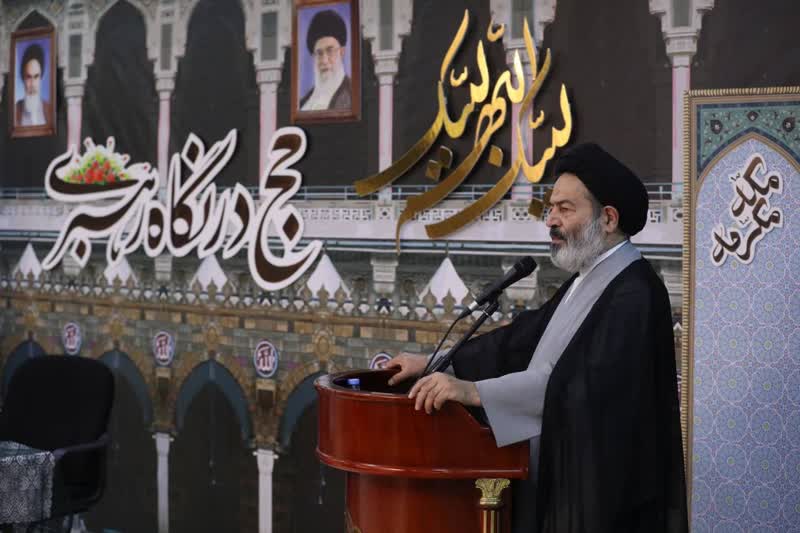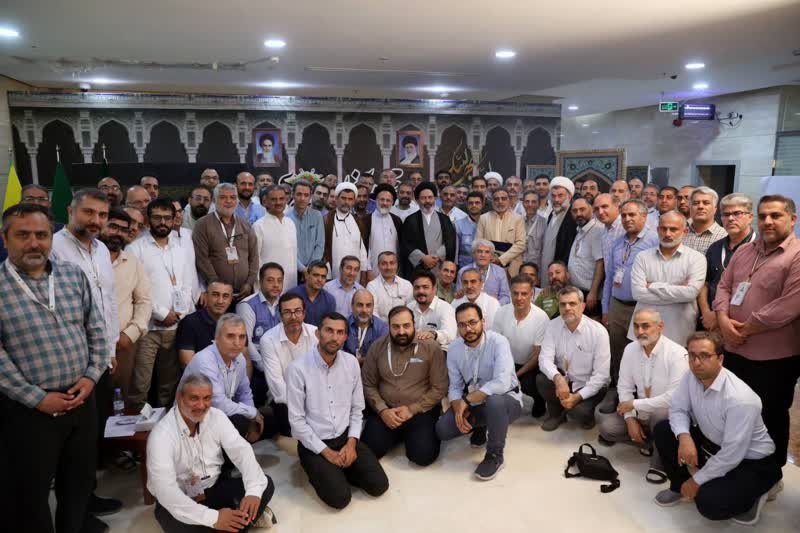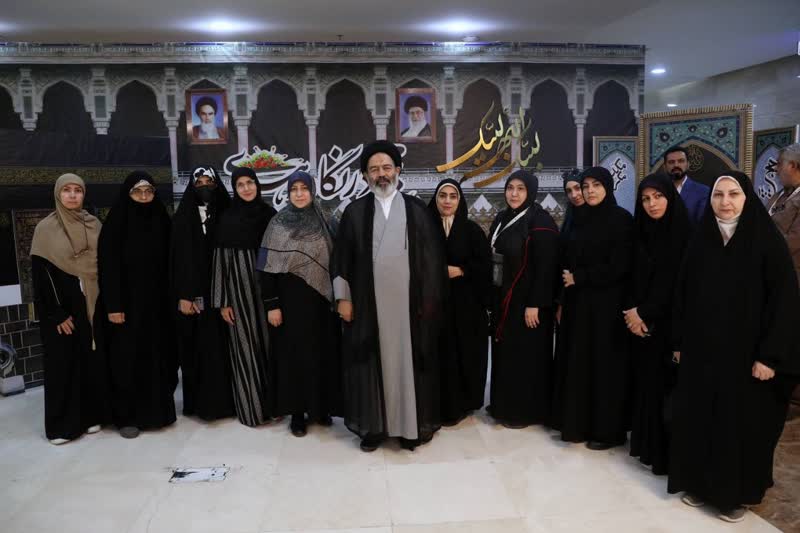Representative of the Supreme Leader in Hajj and Pilgrimage Affairs Told Engineer Pilgrims: Prophet Abraham (PBUH) is Great Architect of the Engineering of Servitude
According to the Hajj Information Center, this Sunday evening, the Engineer Pilgrims Conference was held in Mecca with the presence of the representative of the Supreme Leader for Hajj and Pilgrimage Affairs.
In this conference, three of the selected article presenters presented their articles to the Engineer Pilgrims of Hajj 1404.
At the beginning of this program, Hojjat al-Islam Akhavian, Director of Educational and Cultural Affairs of the Supreme Leader's Mission, referring to the call for articles on the topic of "Hajj from the Leader's Perspective", announced that 162 articles had been submitted by elite pilgrims and said: This week, different groups of elite Hajj pilgrims will present selected articles in separate conferences.
In this conference, Mr. Mohammad Qobadi, presenting an article entitled "Culture-Building Strategies on the Concept of Civilizing Hajj", called Hajj a factor in strengthening social capital and transmitting moral values such as justice and equality, and considered culture-building in this field to require structural and media factors.
Then, Dr. Kazem Shiroudi presented his article entitled "The Acts of Hajj, an Enlightening Window to the World of Meaning and the Unseen" to the attendees, and the last article presented was the article "Prophet Abraham (PBUH), the Founder of Innocence" written by Mr. Mohammad Bahari.

In his speech at this conference, Hojjat al-Islam Seyed Abdolfattah Nawab, the representative of the Supreme Leader in Hajj and Pilgrimage Affairs and the supervisor of Iranian pilgrims, considered the function of engineering to be advancing the processes of construction and maintenance and the optimal use of facilities for the greater benefit of divine servants. Stating that the history of engineering is equal to the history of man, he said: God has created man in a way that inherently seeks to benefit from facilities in an optimal way.
He continued by distinguishing between two groups of engineers: the first group, engineers who work solely on material objects and matters and sometimes forget themselves and the deeper layers of humanity, and the second group, divine engineers who have also paid attention to the deeper layers of creation and humanity.
The head of the Iranian pilgrims described the highest and most important aspect of engineering as the engineering of servitude and humility before God Almighty, and said that an excellent example of spiritual and devotional engineering design is Prophet Abraham (PBUH), who worked on and had an impact on various layers of human existence.

Continuing his speech, Hojjat al-Islam Navvab presented some interpretive points from verses 124 onwards of Surah Al-Baqarah, which refer to the story of Prophet Abraham (PBUH) and his design of the engineering of servitude and the construction of the Kaaba.
Recounting the story of the departure of the young wife of Prophet Abraham (PBUH) from Palestine to the side of the Kaaba, with great hardships, he pointed out several messages of this story and said: The fact that the wife of Prophet Abraham (PBUH) remained in this land, with her infant child, is a sign of the faith she had in God and the words of Prophet Abraham (PBUH).
The head of the Iranian pilgrims continued: Prophet Abraham (PBUH) followed this action and established the Kaaba and established the prayer, and this is one of the greatest and most influential engineering feats in history.
Hojjat al-Islam Navvab described one of the necessities of planning and engineering as "establishing a base" and, stating that the "Kaaba" as the base of religion was built by Abraham (AS), noted: The continuation and continuity of the path is another requirement of planning and engineering, and one of the needs of the successor and continuer of a path is his participation in the first matter; Prophet Abraham paid special attention to this matter, and Prophet Ismail (PBUH), who helped his father in building the Kaaba, continued his path. Just as Imam Ali (AS) was also the continuer of the movement of the Great Prophet (PBUH).
He described "sacrifice" and "being a jihadist" as another necessity of religious and divine engineering, and said: A divine engineer does not seek material rewards or wages; as the Prophet Muhammad (PBUH) also said: “I do not ask you for any reward for it except love for my relatives.”

The head of Iranian pilgrims continued by describing "being a Muslim" and "submitting to God" as another necessity of spiritual and devotional engineering, referring to verse 128 of Surah Al-Baqarah, which states: “Our Lord, and make us Muslims [in submission] to You and from our descendants a Muslim nation [in submission] to You.”, said: Having a plan is another condition of a constructive leader and worship engineer; and Abraham (peace be upon him) asks God to teach him the plan of this divine path; as he says: “Our Lord... show us our rituals”; O God, teach me the rituals; and he continues: “And repent to us”; Accept our repentance. Because purity is an essential characteristic for this spiritual engineering.
Hojjat al-Islam Navvab, referring to the next verse of Surah al-Baqarah, which is quoted from the mouth of Prophet Abraham, says: “Our Lord, and send among them a messenger from themselves...”, called foresight another necessity of spiritual engineering.
In another part of his speech, he emphasized that if Abraham (PBUH) and the Abrahamic religion have survived, it is because of the wise spiritual engineering of Prophet Abraham, saying that this engineering was taken from God and that is the secret of its permanence.
The representative of the Supreme Leader for Hajj and Pilgrimage Affairs also appreciated the content of the articles presented and made some points to complete some of their parts.









